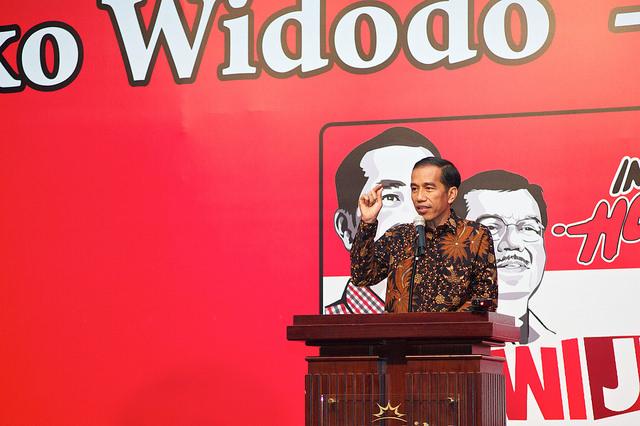Joko Widodo’s Indonesia: possible future paths
Posted By Peter McCawley on September 25, 2014 @ 12:15
 [1]
[1]With a population of around 250 million, Indonesia is the world’s third-largest developing country. What’s less well-known is that Indonesia is the de facto leader of ASEAN, a key regional grouping with a population of over 600 million people and a combined GDP (2012 PPP estimates) approaching that of India and Japan. Therefore, Indonesia’s prospects to 2020 and beyond should be a central consideration for international policymakers considering likely trends in Asia during the decade ahead.
This survey looks at the possible paths for policy and development in Indonesia under the leadership of the seventh president of Indonesia, Joko Widodo, who will take office in Jakarta on 20 October. The first part of the survey is a stocktake of the challenges that lie ahead after ten years of largely peaceful and progressive administration under the leadership of Indonesia’s sixth president, Susilo Bambang Yudhoyono (SBY). The stocktake assesses the state of play in five areas: the political system; economic challenges; government and administration; social issues; and foreign affairs.
Then two possible scenarios of governance under the new administration are considered:
- An outward-looking reform path would be likely to be harder to implement in the short term but promises significant gains in the medium term.
- An inward-looking resilience path would perhaps be a more popular option with some powerful groups in Indonesia but would delay many urgently needed reforms.
President Joko Widodo will face a range of early challenges. He’ll need to build good political support for his programs within Indonesia to be able to follow a reform path. And the economic challenges he faces are formidable. He has promised to try to reduce Indonesia’s large energy subsidies, which are limiting fiscal policy, but that won’t be easy. He has also identified the need to encourage investment, boost support for infrastructure development, and implement poverty-alleviation programs. Reform of government and administration will also be needed. Widodo has often expressed his personal frustration with the delays and inefficiencies of the public sector in Indonesia. As president, the buck stops with him. It’s now up to him to implement public-sector reform.
In the area of foreign policy, he’ll have little time to review issues before three major international meetings appear on his agenda. Within three weeks of his appointment, there’ll be APEC in Beijing, the East Asia Summit in Naypyitaw and the G20 in Brisbane. At those meetings, both he and the policies of the new government will come under close attention. The international community will have an opportunity to gain an early first-hand impression of the style of the new president and of the prospects for Indonesian economic policy under the new administration. Outward-looking statements in two areas would send a clear positive signal: a statement encouraging stronger economic growth by promoting investment and structural reform (not protectionism), and a statement in support of the growing role of ASEAN in regional cooperation programs.
But there’s no guarantee that it’ll be easy for Widodo to implement reforms. He may find that there are considerable pressures on him to adopt a more inward-looking resilience scenario. Indeed, the new president might not find it easy to govern.
Widodo’s position is difficult because, although he won the presidential election in July, the oppositionist pro-Prabowo Subianto grouping in the parliament appears to have a clear majority of seats after the legislative elections in April. Widodo may need to draw on all of his considerable political and negotiating skills to work with a parliament in which the majority bloc of votes is so unsympathetic to the administration.
The new president may also find it difficult to adopt economic policies promoting outwardly-oriented economic growth. Recently, the overall rate of economic growth in Indonesia has been slowing. The Indonesian economy needs to grow at 6% or more per year to generate enough jobs to absorb new entrants to the labour force. But the current growth rate is trending downwards, at close to 5% per year. Somehow, Widodo needs to find ways to boost growth across the economy.
President Joko Widodo may also find that it’s not easy to promote reform within government. Recent experience in Indonesia isn’t encouraging. Proposed reforms set out in a law introduced by the SBY administration proved difficult to implement. Similarly, the incoming president has raised expectations among civil society groups. There are now wide expectations among activist groups that supported him that he will pursue ‘pro-people welfare’ programs. But the cost of implementing those programs is considerable, and the national budget is strictly limited.
In contrast to a reform-oriented foreign policy, a nationalist policy focused on domestic resilience could be less accommodating and more cautious about participating in ambitious international or regional plans. Many Indonesians would support an approach of this kind, maintaining that Indonesia can only hope to provide leadership across the region once the country has strong institutions and a strong economy.
At the end of a largely peaceful and progressive ten years of administration under SBY, Indonesia’s institutions have grown stronger, and its international standing has risen. The country’s seventh president, Joko Widodo, will now need to decide whether to adopt an outward-looking reform program or to pursue a more inward-looking approach intended to promote resilience at home. Perhaps, depending on circumstances, he’ll select policies that combine elements from both the reform and the resilience paths.
Peter McCawley is currently a visiting fellow at the Indonesia Project, ANU. His most recent work in Indonesia (2011–2013) has been with the SEADI (USAID) project in Jakarta as an economic advisor in the National Planning Board (Bappenas). This post is adapted from a new ASPI Strategy released today, available for download here [2]. Image courtesy of Flickr user Hendrik Mintarno [3].
Article printed from The Strategist: https://aspistrategist.ru
URL to article: /joko-widodos-indonesia-possible-future-paths/
URLs in this post:
[1] Image: https://aspistrategist.ru/wp-content/uploads/2014/09/14562514651_9182fb0bc5_z.jpg
[2] here: https://www.aspistrategist.ru/publications/joko-widodos-indonesia-possible-future-paths
[3] Hendrik Mintarno: https://www.flickr.com/photos/hendrik_mintarno/14562514651
Click here to print.